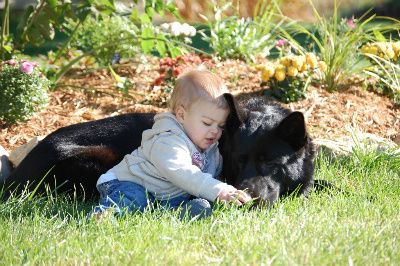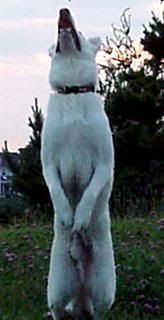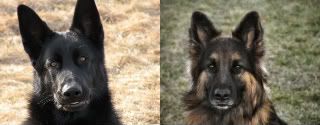 Re: Out as a pack issue?
[Re: Benjamin Colbert ]
#171585 - 12/29/2007 03:29 PM Re: Out as a pack issue?
[Re: Benjamin Colbert ]
#171585 - 12/29/2007 03:29 PM |
Webboard User
Reg: 10-24-2003
Posts: 5
Loc:
 Offline Offline |
|
Benjamin,
Go to the Leerburg CD's and observe Bernhard Flinks and even more recently Cesar Millan. When thhey are giving instruction to a dog owner they, the dog and the owner become a temporary pack of three. Bernhard, for example, assumes the role of pack leader as he is the most experienced and the owner gladly accepts him in this role. Whether it is a question of getting the dog to know what's required of him or getting the dog to out when the dog already knows the command and even though both owner and Bernhard uses leash corrections with, say a prong, the dog will most likely obey Bernhard because he picks up on Flink's pheromones and senses his stronger energy.
The dog never read B.F. Skinner or Karen Pryor but his DNA tells him to respect and follow the stronger leader and shun or destroy the weaker one.
Every dog from GSD to chihuahua models its behavoir from the Wolf Pack. It's in their genetics.
|
 Top Top
|
 Re: Out as a pack issue?
[Re: Benjamin Colbert ]
#171589 - 12/29/2007 03:43 PM Re: Out as a pack issue?
[Re: Benjamin Colbert ]
#171589 - 12/29/2007 03:43 PM |
Moderator
    
Reg: 10-27-2001
Posts: 2261
Loc: Eastern Maine
 Offline Offline |
|
I believe that dogs are genetically social animals and they enjoy and need our company. I also believe that there is no genetic inclination to want to be the leader or to be "dominant".
If you want to see this in action, open your home to rescue dogs. Go to a doggie daycare, or a dog park(don't take a dog), watch a litter of puppies, etc. Believe what you want, but pack drive is alive and very well.
|
 Top Top
|
 Re: Out as a pack issue?
[Re: Deanna Thompson ]
#171604 - 12/29/2007 04:20 PM Re: Out as a pack issue?
[Re: Deanna Thompson ]
#171604 - 12/29/2007 04:20 PM |
Webboard User
  
Reg: 10-06-2005
Posts: 2686
Loc: llinois
 Offline Offline |
|
Benjamin, further expanding on what I asked you a few posts ago, if not genetic, what do you think it is from and how would you suggest it be preventable. I obviously disagree wholeheartedly that there is no genetic inclination, but I am curious.
Like Deanna said too, PUPPIES do this. Explain! 
|
 Top Top
|
 Re: Out as a pack issue?
[Re: Benjamin Colbert ]
#171690 - 12/29/2007 10:46 PM Re: Out as a pack issue?
[Re: Benjamin Colbert ]
#171690 - 12/29/2007 10:46 PM |
Webboard User
 
Reg: 05-08-2006
Posts: 687
Loc: Washington
 Offline Offline |
|
Benjamin, I'm not sure why you are skeptical of pack behavior or pack leadership, but I'll ask a question or two and relate a story to you.
Have you ever been eating in front of a dog, and had the dog become aggressive towards you to get your food?
When my dog was 15 weeks old, I'd sit down and eat a piece of fruit or a sandwhich in front of him. At first he'd sit, like he does when expecting a treat. When that didn't get him any food, he started growling and barking at me, and snapping. I believe he was challenging me. I contacted Ed, who recommended I read his articles, watch his DVDs, and learn about pack structure, which I did.
To solve the problem, we put him on a line whenever he was out of the crate, and issued a correction when he became aggressive. Whenever he showed other behaviors that indicated to us he was challenging us, we grabbed the line and gave him a correction. We also followed the instructions in Ed's DVDs and articles.
After awhile just putting the line on him stopped the aggressive behavior. After awhile we didn't need the line anymore. He's almost two years old now. He'll still come over and sit and hope we'll give him food when we eat, but he doesn't growl, bark, or snap at us anymore. When we are at the dining room table, he'll come over and lie down. There have been other instances, spread out over time, where it appears to us that Hans tried to challenge the pack hierarchy. Such refusing to get off of furniture, and barking, growling and snapping at us when we tell him to. (Problems also fixed following Ed's advice.)
So what has happened here? Have we established ourselves as pack leaders, or did something else happen. And if something else happened, as the result of following Ed's advice on establishing pack leadership, how do you tell the difference?
|
 Top Top
|
 Re: Out as a pack issue?
[Re: randy allen ]
#171696 - 12/29/2007 11:26 PM Re: Out as a pack issue?
[Re: randy allen ]
#171696 - 12/29/2007 11:26 PM |
Webboard User
  
Reg: 12-16-2007
Posts: 2851
Loc: oklahoma
 Offline Offline |
|
Yuko,
Cats are mostly solitary creatures aren't they.
What would account for packs like lions? They're the only cats I can think of that 'pack'. Know of any others?
Randy
While not a pack our three cats and many other domestic cats do live peacebly together and exhibit some group type behavior such as grooming or playing but not the rank deciding behavior that dogs have.
But even with Lions they live in a group, hunting cooperatively and sharing living space, grooming etc, but i dont see the dynamic pack structure with even lions or group living housecats that are seen in dogs.
There just isnt the same drive for ranking.
I never truly fully understood the whole pack structure in its complexity and all the behaviors that establish ones place within that pack until we had three dogs with very different personalities. Living with Levi was often a lot like living with a coyote or wolf with his very very canine behavior, his postures, expressions, vocalizations and the like were very clear and almost exxagerated compared to our hounds and more common dogs such as labs or goldens. He taught me so much in his 11 months.
There is no operant conditioning when Nico, the alpha of the dogs, disciplines a pup or even a cat. It takes one raised lip and a growl and then one snap for the up to never again behave out of rank, there was no real physical pain, but the pup immediately understand and complies. This has held true with every young pup she has been around in 10 years. (Quite a few as i seem to aquire strays and then find homes when they are healthy.)
Loki is just now 2 and is a much more submissive dog, but not timid at all, just not dominate, When levi was alive there was constant playfighting, mild acts of dominance on both of their parts, and general annoying posturing.
Never any real aggression though and that is because they were both social secure and not dog aggresive, AND because we fed everyone in separate rooms, separate rooms for bones and constant supervision with toys.
But I believe also because they had clear leadership from both the human DOG which is me and my husband to an extent, but also from a calm assured yet assertive older dog. Because of this they felt secure in their rank and assured they wouldnt succeed in winning that fight.
There are plenty of ways to build your alpha role within the pack without using aggression or discipline and things to do before there is ever an issue.
|
 Top Top
|
 Re: Out as a pack issue?
[Re: Benjamin Colbert ]
#171711 - 12/30/2007 04:25 AM Re: Out as a pack issue?
[Re: Benjamin Colbert ]
#171711 - 12/30/2007 04:25 AM |
Webboard User
  
Reg: 07-14-2007
Posts: 1243
Loc:
 Offline Offline |
|
I mean if you could prove dominance and pack as an instinct then you would shut up trainers like Jean Donaldson and Ian Dunbar and use those results to push OB classes, equipment, videos on being boss...it seems the industry has a lot more to gain by the idea of a dog being a follower instead of a partner.
I'm confused. Why would anyone here want to shut up Ian Dunbar? He advocates leadership.
I don't have the actual studies for you to read Benjamin, but I am working on it. My daughter is a biochemistry major with a concentration in behavioral psychology. Alas, she is only an undergrad but she has no ulterior motive in sharing her opinion with me on this thread. When she gets back to school after the winter break she will see what she can come up with as far as actual studies for you to read. Until then she suggests you google Ian Dunbar and dog pack theory. He has done studies with dog packs along with a Dr. Beech out of UC Berkely.
She thinks you are confusing Dominance Theory with Pack Structure. The dominance theory was based on studies with wolves in the 1940's, which had people alpha rolling their dogs and using other physical ways of maintaining control. In his study of dog packs, Ian Dunbar noted a definite social hierarchy which included a leader or alpha dog. However; control of the pack was in the hands or should I say paws  of the dog who controlled the resources. The alpha status was maintained through psychological control vs. physical control.
I just have a hard time believing that the pack structure is instinctual and not a result of the dog with the most weapons, quickest to aggress, most self confidence (or combination there of) imposing his will by force.
Hopefully my daughter will be able to access the research when she gets back to school; (I'd like to read it myself now) but does say the findings in pack structure studies, would have the type of dog you describe above as being ousted from the pack. Fighting in the pack is detrimental.
As far as the instinctual part goes; this is my teen ager who can cause me to bang my head against walls too and when I tell you her response you may join me in that activity  . When I asked her if she felt the drive to pack was instinctual, she looked at me rolled her eyes and said, "DUH" It's called survival!
|
 Top Top
|
 Re: Out as a pack issue?
[Re: Amber Morgan ]
#171715 - 12/30/2007 05:39 AM Re: Out as a pack issue?
[Re: Amber Morgan ]
#171715 - 12/30/2007 05:39 AM |
Webboard User
  
Reg: 12-16-2007
Posts: 2851
Loc: oklahoma
 Offline Offline |
|
Im no expert and there are many here who have done much more training of dogs than I. But I do have a degree in psychology and animal behavior was one of my focuses and is still one of my passions. I find the interactions between my three dogs absolutely fascinating. the following is really long and probably more effort than I should have put into this thread which I honestly feel is silly.
As a side note Children also form packs and the dynamics arent so different from wolf or dog packs. That is why firm fair consistent leadership is so important in producing happy healthy well adjusted children without the issues so many seem to have nowadays.
I was thinking about the absurdity of dogs not having an inborn pack behavior and how pack oriented my huskies are.
Huskies more than many other dogs are very dog social and tend to not do well as only dogs in a household, especially if their people are gone all day.
In my experience huskies also exhibit much more clearly wolf like behavior when interacting with other dogs, they make it abundantly obvious when observing their interactions with people and especially other dogs. There is exaggerated body postures, ear and head movements and positioning as well as vocalizations. They are also a very old and fairly primitive breed that had a fairly unique lifestyle up until about a 100 yrs ago. in the winter the were expected to stay in camp, pulling sleds for hunting expeditions, nomadic movements of the tribe and act as an alarm for the camp. The often slept inside with their people at night and would curl up with the children to help keep them warm, hence the term three dog night. In the summers, from what I have read they were often set free to hunt and support themselves and would instinctively return in the fall.
Now taking into consideration their extreme enviroment and the jobs for which they were raised and selectively bred a strong pack mentality was of the utmost importance.
You would have a few true leaders in the tribes dogs, these became the front dogs on the sled team and all of the other dogs had to be willing to literally follow the lead dog. They had to be able to think well enough for themselves to not run the rest of the team or the sled driver of into a ravine, but enoug cooperative drive to be closely tethered and totally amped up without fights breaking out.
Operant conditioning does not explain this breeds inherant enthusiastic pack behavior, it does not explain why a few dogs were lead dogs, the ones with the drive to be in front and in charge while the majority was content to run all day and do what they were made to do but with zero competition to the other dogs on the team.
Selective breeding on the part of the chuchki tribe does account for a lot of these traits, but the same traits would naturally continue in a pack of wolves or totally feral dogs. The ability and desire to follow a leader, hunt or work cooperatively equals success in any sort of family/pack/hierarichal group whether canine or human. Operant conditioning is a natural phenomona in life, you do something, something good happens, you will do it again.
I can use a clicker to teach my cat to fetch a ball, she will continue to do it because she gets paid for it. But if something scary happens or she is feeling threatened she sure as heck isnt going to look to me, she is going to either launch a full blown attack or run, whichever suits her mood at the time.
Certainly she loves me and gives plenty of affection, but she could give two hoots whether or not I am pleased with her, as long as i feed her i will suffice.
Actual aggression within a wolf or dog pack is fairly rare when the ranking is established. There is a sort of ritualized violence, growling, hackles raised and the fake nip where no contact is made but the pup/submissive still yelps like made and then apologizes. Submissive dogs/wolves will often show their belly and even pee to the dominant and this was initally mistaken for the alpha doing the rolling by force because it is seem during play or during conflict. This was also assumed when wolves were still considered vicious vermin.
Using belly rubs or rolling during play can accomplish what the alpha rollers where going for without the danger and risk to the dog handler bond. Simple things such as standing on their bed, making them work for food, or appearing to eat out of their bowl,occasionally standing on their bed while they arent on it can reinforce pack structure. I also routinely take toys and then give them back at my leisure from the time they are tiny pups. ( my own dogs, never an adult rescue or someone elses dog!)
The pack leader in a wolf or coyote or dog pack controls the resources, who eats when, who and when is allowed to fight or argue, who mates and who gets to sleep in the prefered spot. In our dogs world a successful pack leader also controls resources they just happen to be food, beds, affection and toys. there are different methods to achieving this but often dogs who seem quite well behaved are actually quite in charge of their people and just happen to be laid back and non threatening by nature.
Also i have never heard of adult wolves regularly leaving the pack. an outcast lone wolf is not an existence natural to their being and would greatly reduce chance of survival. From what I understand they also feed and dote on their senior citizen pack members and will often provide food for an injured member for a time while it heals.
|
 Top Top
|
 Re: Out as a pack issue?
[Re: Jennifer Lee ]
#171750 - 12/30/2007 10:10 AM Re: Out as a pack issue?
[Re: Jennifer Lee ]
#171750 - 12/30/2007 10:10 AM |
Webboard User
  
Reg: 10-06-2005
Posts: 2686
Loc: llinois
 Offline Offline |
|
Oohhh, BENJAMIN! We're WAITING....<sing-song voice> 
|
 Top Top
|
 Re: Out as a pack issue?
[Re: Jenni Williams ]
#171763 - 12/30/2007 10:36 AM Re: Out as a pack issue?
[Re: Jenni Williams ]
#171763 - 12/30/2007 10:36 AM |
Webboard User
  
Reg: 08-30-2007
Posts: 3283
Loc:
 Offline Offline |
|
Yeah,
I remember a promise of a million writtings that refute the pack model in canines.
Does any body here know what he was trying to say?
I must be dense, because I've gone over it all too many times, I still can't figure out he wanted to get across.
It makes my brain hurts. lol.
Randy
|
 Top Top
|
 Re: Out as a pack issue?
[Re: Jenni Williams ]
#171768 - 12/30/2007 10:48 AM Re: Out as a pack issue?
[Re: Jenni Williams ]
#171768 - 12/30/2007 10:48 AM |
Webboard User
 
Reg: 11-23-2007
Posts: 947
Loc: Cold-ville, Wisconsin.
 Offline Offline |
|
Ben, you are confusing what everyone is saying.
Pack structure, the need to fit in a pack and obey is very much genetic, in fact, it means the difference between life and death. That is why many dogs freak when you leave them, it is why one of mine broke through a window to follow me down the road, it is why we can so easily live together. We BOTH are pack animals.
But, dominance, real alpha dominance, is not present in every single dog, so it isn't genetic in that way. Out of a whole litter, only maybe one or two pups have what it takes to lead that pack, plus one or two that think they do. The rest get it.
ALL dogs have pack instinct, the need to have a rank and work within that. Not all dogs have the drive to be the alpha dog, but all dogs try to be dominant over a weaker dog.
Dog A might be alpa, Dog B at the very bottom, and Dog C right in the middle.
Just because dog C is more dominant than dog B doesn't mean he wants to be the pack leader. His dominance is there, but it isn't the same level as the alpha.
so, yes, pack drive and dominance are genetic, but on different levels.All dogs are genetically built to be dominant over weaker energy. Not all dogs are genetically built to be the top dog.
|
 Top Top
|
When purchasing any product from Leerburg Enterprises, Inc. it is understood
that any and all products sold by Leerburg Enterprises, Inc. are sold in Dunn
County Wisconsin, USA. Any and all legal action taken against Leerburg Enterprises,
Inc. concerning the purchase or use of these products must take place in Dunn
County, Wisconsin. If customers do not agree with this policy they should not
purchase Leerburg Ent. Inc. products.
Dog Training is never without risk of injury. Do not use any of the products
sold by Leerburg Enterprises, Inc. without consulting a local professional.
The training methods shown in the Leerburg Ent. Inc. DVD’s are meant
to be used with a local instructor or trainer. Leerburg Enterprises, Inc. cannot
be held responsible for accidents or injuries to humans and/or animals.
Copyright 2010 Leerburg® Enterprises, Inc. All rights reserved. All photos and content on leerburg.com are part of a registered copyright owned by Leerburg Enterprise, Inc.
By accessing any information within Leerburg.com, you agree to abide by the
Leerburg.com Privacy Policy and Terms of Use.
 Previous Topic
Previous Topic Index
Index Next Topic
Next Topic











 Top
Top



 of the dog who controlled the resources. The alpha status was maintained through psychological control vs. physical control.
of the dog who controlled the resources. The alpha status was maintained through psychological control vs. physical control.




